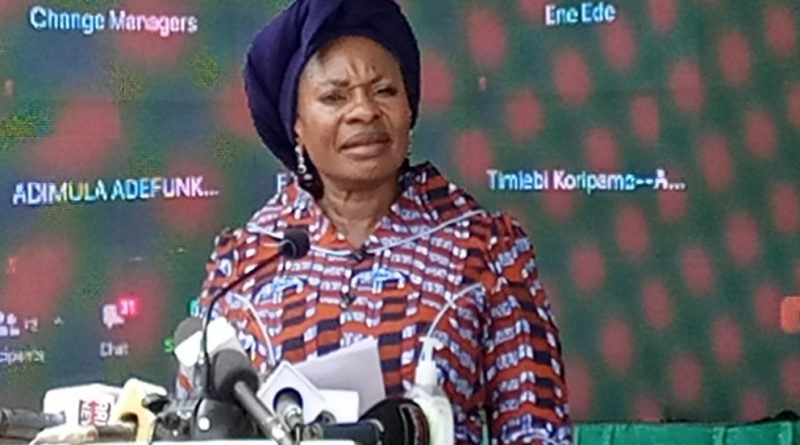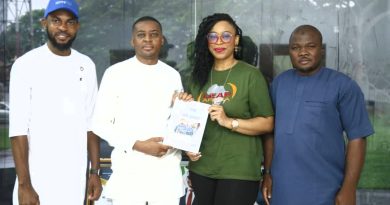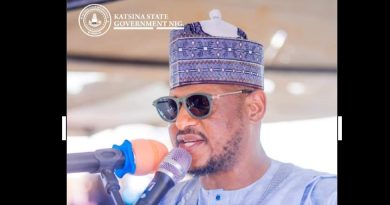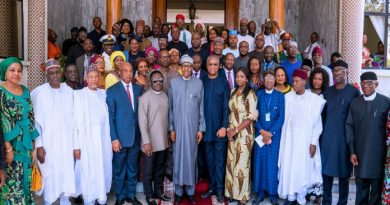THE CONSTITUTION WOMEN DESIRE- DAME TALLEN …..Calls for domestication of all Intertional treaties and representation of Women in the Constitution
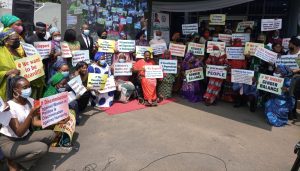
Oru Leonard
The Minister of Women Affairs, Dame Pauline Tallen, has called for the full domestication of international treaties and full representation of Women and human right issues in the Constitution
The Minister said this on Monday while in a media briefing ahead of the Zonal Public Hearing on the Proposed Ammendments to the relevant part of the Constitution of the Federal Republic of Nigeria, 1999, titled, “The Nigerian Constitution Women Desire”.
She noted that over the years, Nigerian women and other critical stakeholders have continued to mobilize and strategize to seek interpretations of the 1999 Constitution as amended, with the sole objective of getting legal backing for deliberate inclusive governance in Nigeria.
She further said that Nigerians and indeed Women yearn for a Constitution that truly represents the preamble, noting that as it stands, the Constitution does not adequately afford women the opportunity to enjoy the same status as men, so that they can fully realize their human rights and have a meaningful impact on the society.
The Minister said it is important the Constitution is reviewed to provide for at least 35% women representation in appointive offices at the Federal and State levels to ensure equitable women representation in Government. She also said that women need to be fully represented in the Constitution, first by recognising the use of gender-neutral and sensitive language.
“A country’s Constitution is the single most important document, particularly as it directs the affairs of the Government and People. Therefore, its processes and procedures should be inclusive and take cognizance of expectations and concerns of all and ensure people-centered legislation.
“As representatives of Nigerian who make up almost 50% of the Nigerian population are committed to rapid national development in Nigeria and appreciate the growing consensus on the important role women play in development globally. It would be recalled that the Federal Ministry of Women Affairs working with a cross section of CSOs had earlier submitted a Memorandum in response to the call for submission made by the 9th National Assembly on the Review of the 1999 Constitution in September, 2020”, she stated
Tallen disclosed that the zonal public hearing which will run simultaneously will begin with an amendment of section 14 subsection (3) that prohibits predominance of persons from a few States, ethnic or sectional groups in the composition of the Government and its agencies to also introduce a prohibition of the predominance of any sex in the composition of the government and its agencies.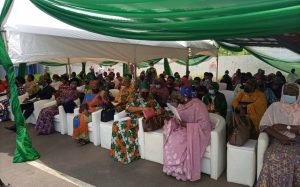
Also, Section 14 (4) introduces the equitable representation of both sexes in the composition of government at a state, Local Government Councils, or any of its agencies. Other sections for reference include sections 147(3), 171(5), 192(2), 208 (4).
“In addition, we fully back the proposal to include Gender as a benchmark for Federal Character and related matters. And to create additional special seats for women in the Federal and State Legislative Houses, by altering among other sections, in the 1999 constitution:
1. Section 48 of the Principal Act be altered by substituting the existing section 48 with a new section “48”: Composition of the Senate: The Senate shall consist of:
b. three Senators from each State and one from the Federal Capital Territory; and
c. an additional Senator for each State and for the Federal Capital Territory, who shall be a woman.
2. Section 49 of the Principal Act be altered by substituting the existing section 49 with a new section “49”:
b. Composition of the House of Representatives:
c. Subject to the provisions of the Constitution, the House of Representatives shall consist of:
d. three hundred and sixty members representing constituencies of nearly equal population as far as possible provided that no constituency shall fall within more than one State; and
e. two additional members for each State and for the Federal Capital Territory, who shall be women.
3. Section 71 of the Principal Act be altered by inserting immediately after sub-sections (1) (a) and (b), new subsections “(2)” and “(3)”:
71. Senatorial districts and Federal Constituencies:
(1) Subject to the provisions of section 72 of the Constitution, the Independent National Electoral Commission shall:
(a) divide each State of the Federation into three Senatorial districts for purposes of elections to the Senate;
(b) subject to the provisions of section 49 of the Constitution, divide the Federation into three hundred and sixty Federal constituencies for purposes of elections to the House of Representatives.
(2) For the purpose of section 48 of the Constitution, a State shall constitute an additional senatorial seat to be occupied by a woman.
(3) For the purpose of section 49 of the Constitution, the Independent National Electoral Commission shall divide each State of the Federation into two Federal constituencies to be occupied by women.
5. Section 77 of the Principal Act is altered in subsection (1) by substituting the words “every Senatorial district or Federal constituency” in lines 1 and 2 with the words “every Senatorial district, Federal constituency and the additional seats”:
“77. Direct election and franchise:(1) Subject to the provisions of the Constitution, every Senatorial district, Federal constituency, and the additional seats established in accordance with the provisions of this Part of this Chapter shall return one member who shall be directly elected to the Senate or the House of Representatives in such manner as may be prescribed by an Act of the National Assembly.”
6. Section 91 of the Principal Act is altered by substituting the existing section 91 with a new section “91”:
“91. Composition of the House of Assembly:
(1) Subject to the provisions of this Constitution, a House of Assembly of a State shall consist of:
(a) three or four times the number of seats, which that State has in the House of Representatives divided in a way to reflect, as far as possible, nearly equal population; and
(b) one additional member from each of the three senatorial districts in the State referred to in section 48 (1) (a) of the Constitution, who shall be a woman.
(2) Notwithstanding the provision of subsection (1) of this section, nothing shall prevent a woman from contesting for any of the seats in the constituencies referred to in subsection (1)(a)
(3) The provisions of subsection (1) (b) shall commence after the current life of the State House of Assembly and shall be reviewed after 16 years from its commencement notwithstanding any other provision of this Constitution.
Provided that a House of Assembly of a State shall consist of not less than twenty-four and not more than forty-three members.”
7. Section 117 of the Principal Act is altered in subsection (1) by inserting immediately after the words “every State constituency” in line 1, the words “and the additional seats”:
“117. Direct election and franchise:
(1) Subject to the provisions of the Constitution, every State constituency and the additional seats established in accordance with the provisions of this part of this Chapter shall return one member who shall be directly elected to a House of Assembly in such manner as may be prescribed by an Act of the National Assembly.”
The Minister called on the 9th National Assembly headed by the gender-friendly, ‘He-For-She’ Senate President, Dr. Ahmed Lawal, and the Rt Honorable Speaker, Femi Gbajabiamila, to act immediately in support of the women course”.
She Commended all the partners from all walks of life, men and women alike, who have worked tirelessly to ensure that the voices of Nigerian Women in the on-going process are clearly articulated. I want to use this opportunity to thank the Nigerian Women Trust Fund, 100 Women Lobby Group, Centre for Democracy and Development, Coalition of Women in Governance and leadership, Women’s Aid Collective, Legal Awareness for Nigerian Women, Equity Advocates, Women in Politics Forum, Girl child empowerment and Reproductive Health Initiative, WARD-C and others.
Over 86 groups were represented online.

